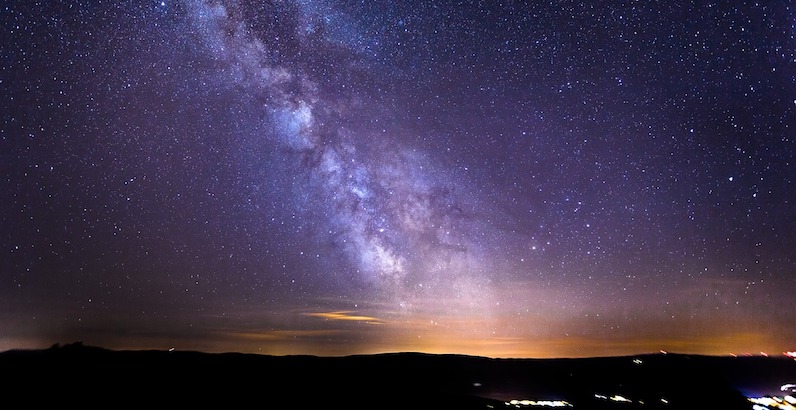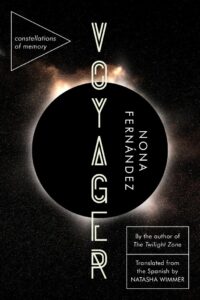
Nona Fernández on the Constellations We Create With Our Memories
“Light from the past illuminates our present.”
My mother has been fainting. Without warning, for no apparent reason, she falls and briefly disconnects. It might be a few minutes or only a few seconds, but when she comes to she can’t remember what’s happened. The moment is tucked away in some hidden corner of her brain. When her eyes open, she generally finds herself under the gaze of a series of strangers trying to help by fanning her or offering her water and tissues.
These strangers tend to try to help her piece together the time lost from her memory. You leaned against the wall, you held your head, you vomited, you sat down on the ground, you closed your eyes, you collapsed. A chorus of voices offering up details of the blackout, enough for her to partially recover the scrap of life hidden in a parenthesis in her brain. It upsets my mother not to be able to remember what happened in these spatiotemporal lapses. Falling down in the middle of the street, collapsing in her seat on the bus or in line at the supermarket—these things are less troubling than the lost minutes of lucidity. The black holes that lurk in her everyday memories bother her more than the bruises she collects each time she faints.
I understand my mother. I have a theory that we’re made up of these everyday memories. It’s not an original idea, but I believe it. The way we wake up, what we have for breakfast, a walk down the street, an unexpected downpour, some annoyance, a surprise in the middle of the day, a story in the paper, a phone call, a song on the radio, the preparation of a meal, the smell from the pot, a complaint filed, a scream heard. Each day and each night lived, year after year, with its full complement of activity and inactivity, upheavals and routines—continuous storing of all this is what translates into personal history.
Our archive of memories is the closest thing we have to a record of identity. It’s the only clue to ourselves, the only way to figure ourselves out. I guess that’s why we’re asked to claim it on the therapist’s couch. Sorting through childhood, adolescence, youth; declaring step by step what we’ve lived. Because all of it—everything collected in the kaleidoscope of our hypothalamus—speaks for us. Describes and reveals us. Disjointed fragments, a pile of mirror shards, a heap of the past. The accumulation is what we’re made of.
Our archive of memories is the closest thing we have to a record of identity.
I understand my mother. Losing one’s memory is like losing a hand, an ear, one’s very navel.
*
On the hospital room monitor I can see my mother’s brain activity. She is lying on a bed, her head sprouting electrodes and her eyes tightly closed. A series of stimuli administered by the doctor triggers electric charges in her brain. A network of hundreds of thousands of neurons interwoven with millions of axons and dendrites exchanging messages via a connective system of multiple transmitters: that’s presumably what I’m seeing translated on the screen. The complexity of what’s going on in there when my mother inhales, exhales, or is illuminated by the soft flickering of a light on her eyelids is indescribable.
And when the doctor suggests a simple relaxation exercise, like thinking of a happy moment in her life, her brain really puts on a show. As my mother conjures some unspoken memory, a group of neurons lights up. In his office, the doctor showed us images of active neurons. Though the picture on the monitor doesn’t translate those electric sparks the same way, what I see looks like a starscape. An imaginary chorus of stars twinkling softly in my mother’s brain, soothing her, steadying her nerves during this test. A network stitching together familiar and comforting sensory details, I guess. Smells, tastes, colors, textures, temperatures, emotions. A neuronal circuit like the most complex stellar tapestry. In my mother’s brain, groups of stars constellate in the name of the fond memory lighting them up.
*
The last time I saw a constellation with any clarity was years ago, up north, far from the polluted skies of Santiago. I spotted Ursa Minor, Orion, the Three Marys, and the Southern Cross, which as a child I was told pointed the way home. I summon the memory and I think about the spectacle surely being staged inside my head.
A moonless night. The cold of the Atacama Desert creeping up the sleeves of my jacket. Some drowsiness, pent-up fatigue. Soreness in my neck from long minutes of gazing skyward. An astronomer indicating different constellations with a laser pointer, explaining to a group of tourists and me that all those distant lights we see shining above our heads come from the past.
Depending how far away they are, we might be talking about billions of years. The glow from stars that may be dead or gone. Reports of their death have yet to reach us and what we see is the glimmer of a life possibly extinguished without our knowing it. Shafts of light freezing the past in our gaze, like family snapshots in a photograph album or the kaleidoscopic patterns of our own memory.
As we stare open-mouthed at the firmament, immersed in our genuinely Paleolithic ritual, I remember a crazy theory my mother came up with when I was little. I think it was at our Barrancas house in the port city of San Antonio, near the sea, another place you could see the stars. Sitting on the patio, smoking a cigarette on a summer night, my mother said that way up there in the night sky little people were trying to send messages with mirrors. A kind of luminous Morse code, relayed in flashes. I can’t remember why she said it. She probably came up with it in response to some question of mine.
What I do remember is that I assumed the messages sent by those little people in the sky were to say hello and assure us they were there, despite the distance and the darkness. Hello, here we are, the little people, don’t forget us. They never stopped signaling. We couldn’t see them during the day, but they were always there. Whether or not we looked up, whether or not we were inside our houses in the city, under a blanket of pollution, blinded by neon lights and billboards, oblivious of what was happening above, the little people’s signals were there and would be there every night of our lives, flashing for us. Lights from the past making a home in our present, lighting up the fearsome darkness like a beacon.
Crazy as her old theory might be, a vague sense of peace came over me when I remembered it on that cold night in the desert. Like a whisper, like the soft voices of grandmothers singing us to sleep, like the memory my mother summoned in the examination room to try to soothe herself. A buried urge for a return to the womb satisfied by that nocturnal scene. The strange sense of an enduring, mysterious, protective reality, confirmed by each of those orbs speaking to me with their light from another time. Hello, here we are, don’t forget us.
*
In a life I never had I was a brave cosmonaut and I navigated the stars I’d always watched curiously. In this life I plunged into strange galaxies, witnessed the explosion of supernovas, escaped from black holes, and crossed entire nebulae; I was surprised by the dance of comets, the streaking passage of tens of meteorites, the presence of white dwarfs and red giants. I saw hundreds of stars as yet unnamed twinkling around me; I yearned to hear their dead voices, heed their cries for help. And from each stage of this voyage I never made, I sent postcards of the starscapes that sprang to life in my mind when I saw a memory of my mother’s on the monitor in that hospital room.
In my mother’s brain, groups of stars constellate in the name of the fond memory lighting them up.
As I learned in the desert, light from the past illuminates our present. My mother summons a happy scene from her life and the neuronal mechanism is a present act that reverberates electrically in the shape of a constellation. My mother revives a scene from her past, and the brain process is a present act as complex as the vast fabric of the cosmos that knits itself mysteriously over our heads, enthralling and confounding us. Wrong though I may be, I like to think that the human brain—the organ used by women and men for centuries to observe the universe and try to understand it—must be one of the most complex systems in the universe.
*
Inside my mother’s brain, stars constellate under the name of the fond memory that lights them up.
But what memory is it?
What piece of her broken mirror are we talking about?
*
Epilepsy, that’s what’s causing my mother’s disconnects. After this test and the many others that preceded it, the neurologist gives us his final diagnosis. The fits are triggered by an excess of electrical activity in one of her neuronal circuits. I imagine something like an energy drain, a cerebral short, a momentary blackout, a halt in transmissions for the duration of one of her episodes. Then brain activity is restored and my mother starts working again. Same as a house when the main fuse blows and everything stops.
Clocks, televisions, radios, refrigerators, the internet, a world on pause, still and silent until someone flips the right switch and the house alarm goes off and the system resets and everything starts up again. As if the short circuit hadn’t frozen anything. As if a moment of life—a hand, an ear, even the navel—hadn’t been lost in that space-time parenthesis.
We exit the neurologist’s office and I look at my mother with new eyes. Now I know that she’s carrying the whole cosmos on her shoulders. I tell her what I saw on the doctor’s screen. I tell her how much her brain looks like the night sky. I tell her about the electrical patterns of her neurons, the glow of her memory, the constellation that lit up the moment she summoned it, the luminescent reflection of her own past. I ask which happy scene it was that I saw twinkling on the monitor in the doctor’s office and she smiles and says she was remembering the moment I was born.
*
My life’s first scene is a constellation in my mother’s brain.
(Hello, we’re the little people.)
The ground zero of my past shining in her head.
(Here we are, don’t forget us.)
The Southern Cross showing me the way home.
__________________________________

Voyager: Constellations of Memory by Nona Fernández, translated by Natasha Wimmer, is available from Graywolf Press.
Nona Fernández
Nona Fernández was born in Santiago, Chile. She is an actress and writer, and has published two plays, a collection of short stories, and six novels, including Space Invaders and The Twilight Zone, which was a finalist for the National Book Award.



















